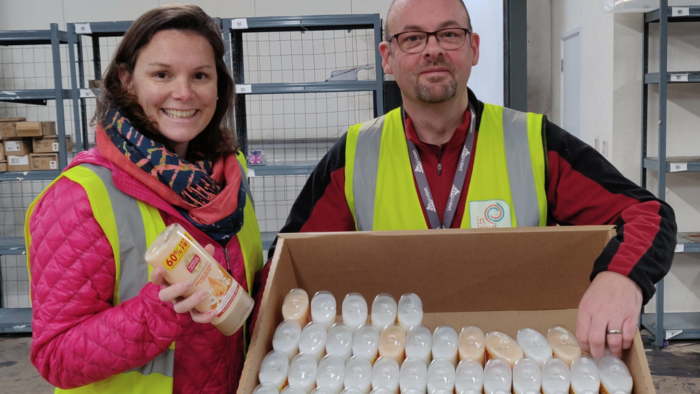As you’ll have seen from our weekly community updates, the work being done by our Fellows, staff and students to help in the fight against Covid-19 has been incredibly impressive and hugely varied. So we were delighted when alumna Rosanne Gray (U98) got in touch to tell us about her role as CEO for In Kind Direct, an organisation that provides life essential products to charity members. Unsurprisingly, Rosanne has seen a huge increase in demand in the last few months, with a 10-fold increase in donations and twice the number of orders coming in, something Rosanne only expects to grow in the coming months.

Rosanne studied Geography during her time at Churchill, deciding on a subject that she was passionate about (and studying hockey sadly wasn’t an option, although she filled most of her spare time playing for the University). Geography allowed her to think about how people connect to the world around them, both environmentally and socially. Since graduating she has led a varied career, with the common theme being roles where she felt able to develop solutions to environmental and social problems in an entrepreneurial way, and during her career she has spent time living in a number of different countries, including China and India.
When we asked her why she chose to accept the role of CEO at In Kind Direct at the end of last year, Rosanne said, “It brings together my experience of corporations and manufacturing as well as my experience of working with charities and communities. It allows me to link between the two worlds.”
In Kind Direct provide life essential products to UK charities. This can include anything from toilet rolls and laundry products to nappies and soap. Via their charity partners, In Kind Direct reach 7.7 million people in UK alone, and have supplied £240m worth of stock since the charity began. From an environmental perspective, they also reduce the amount of these products that end up in landfill. The members of society who benefit from the work of In Kind Direct are hugely varied – they can be those receiving care packs as they leave hospital to those who have had to turn to a refuge to escape domestic violence or conflict in war zones.
But what about the future of the organisation and the charity sector more broadly as the pandemic continues? To begin with, Rosanne needs to consider the safety of her staff. At their warehouse in Telford they have had to triple the team, add more external capacity and introduce social distancing measures such as split shifts. These all come with a cost. As for the charity sector itself, it’s a worrying time. Nationally the sector needed £4bn to survive the initial crisis and the need is only going to increase, as those who were vulnerable before the crisis will turn to the charities that In Kind Direct support.
Speaking of the outlook for the charity sector, Rosanne said, “Covid-19 has brought new thinking, innovation and greater collaboration to our sector. We are going to need this new approach in bucket loads to weather the economic storm that lies ahead. Charity reserves are running dry while the numbers of people needing support is increasing.”
But she is optimistic. Having already seen donations from industry increase, there is reason to hope that this will continue. However, In Kind Direct still rely on personal donations and relationships with Patrons in order to meet the needs of the most vulnerable in our society, as 40% of their costs need to be fundraised. But despite these growing pressures, Rosanne still hopes that other charities and companies will want to join forces with In Kind Direct, which is where the Churchill community come in – if you work for a charity or are part of a business with surplus products, you can find out more on their website about how they could help you. Because after all, we’re all in this together.
